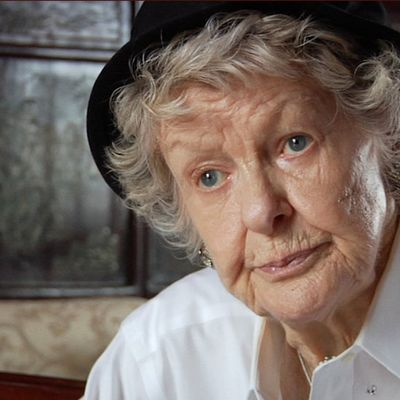
My one (distant) experience with Elaine Stritch ÔÇö subject of a pretty grim doc called Elaine Stritch: Shoot Me┬áÔÇö was 21 years ago when I was doing graduate work at a repertory theater in Cambridge, Massachusetts. Stritch was playing Lillian Hellman in an atrocious autobiographical play called Cakewalk, written by HellmanÔÇÖs untalented young lover and heir. The theater was attached to an acting conservatory, and students in the production would walk out of the rehearsal room looking pale and shaken. When I asked what Stritch was like theyÔÇÖd only whisper, ÔÇ£You have no idea.ÔÇØ I saw her in action once, when she answered studentsÔÇÖ questions for an hour. These performers, most in their early 20s, were working their hearts out, talking movement and voice and acting classes all morning, rehearsing all afternoon, and performing in the evening. One happened to stifle a yawn while Stritch was talking and the womanÔÇÖs gaze was laser-like. ÔÇ£Am I boring you?ÔÇØ she snapped. It was all I could do to keep from walking out. Katharine Hepburn could get away with that shit, maybe. Otherwise, who needs it?
Oddly, the students ended up saying Stritch was worth it. They even sort of liked her. And despite the abomination that was Cakewalk, she was moving. That cracked, husky voice wasnÔÇÖt HellmanÔÇÖs but I bet it was how Hellman wished sheÔÇÖd sounded.
Chiemi KarasawaÔÇÖs documentary alludes to Stritch, now 89, being a pain in the ass: The actress reads from a Woody Allen letter saying he wants to use her in September but not if sheÔÇÖs as disruptive as he hears. (She got the part and behaved herself.) But apart from a guest slot in the final season of 30 Rock (where the cast is deferential), sheÔÇÖs not shown interacting with (and/or eviscerating) other performers. Karasawa spends a lot of time on a one-woman Sondheim show Stritch did a few years back at the Carlyle. She has trouble remembering the tricky lyrics and misses every other note, but the audience is pulling for her. In interviews, they marvel that she still has the moxie to take to the stage in her late eighties. IÔÇÖm not sure that I could have handled the suspense, though.
In the early days of TV, Stritch did a lot of live theater broadcasts and was a bona fide Broadway sensation. Alas, little of that is accessible. Her performance of SondheimÔÇÖs ÔÇ£The Ladies Who LunchÔÇØ on the Company soundtrack, though, is one of the best numbers on any original cast recording ever; and Karasawa uses excerpts from the good D.A. Pennebaker documentary Company: Original Cast Album in which she blows take after take, comes back the next day, and hits it over the fence. You watch and think, ÔÇ£Wow. Just wow.ÔÇØ IÔÇÖd love to have seen her Joanne. IÔÇÖd love to have seen so much more. There are scattered clips of Stritch in her prime, but weÔÇÖre largely in the present, where she struggles with diabetes and the need to drink despite more than 20 years of sobriety. SheÔÇÖs a widow, an exhibitionist, and she welcomes the chance to exist on camera ÔÇö even when sheÔÇÖs fighting her demons.
Elaine Stritch: Shoot Me is one of those showbiz docs thatÔÇÖs not exactly pleasurable but offers a penetrating glimpse ÔÇö sometimes too penetrating ÔÇö into what it means to eat, drink, and be contrary in the public sphere.┬áItÔÇÖs also a documentary about aging and its myriad horrors. Like Stritch, itÔÇÖs sort of worth it, though I still was afraid to yawn for fear of a voice from the shadows: ÔÇ£Am I boring you?ÔÇØ


